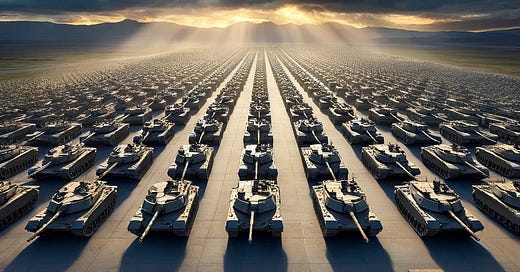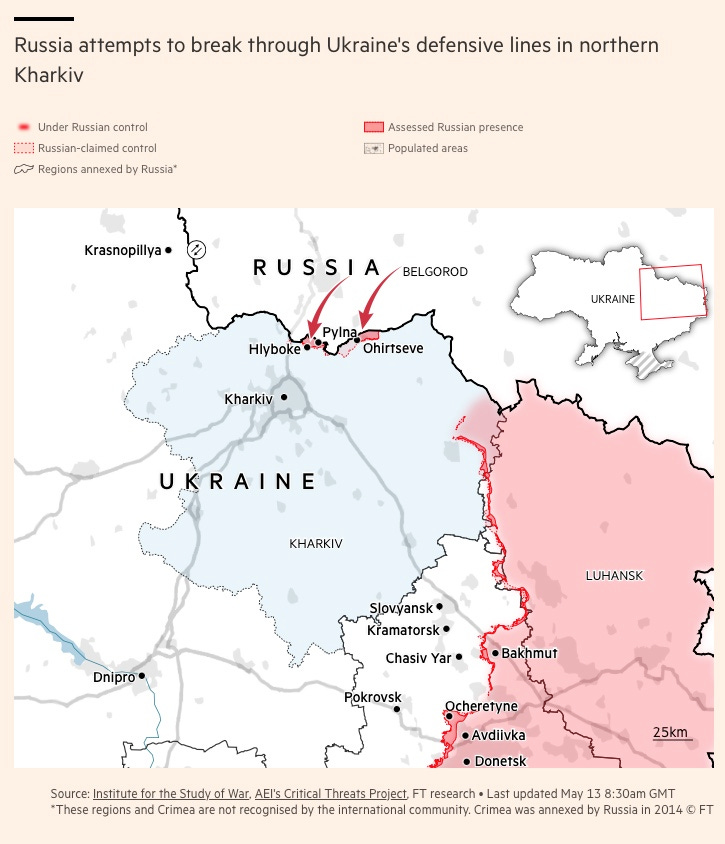1 Carmakers bet on hybrids as shift to EVs slows
2 Federal subsidies spur half trillion in private investment
3 Multi-state, 140 hospital chain paralyzed by cyberattack
4 Elements of US Catholic Church becoming more conservative
5 Ukraine: Russian offensive advances; Putin replaces Defense Minister with economist
5/13/1846 US declares war on Mexico
see ad astra on x @greg_loving
1 Carmakers bet on hybrids as shift to EVs slows
Global carmakers are stepping up their investment in hybrid technologies as consumers’ growing wariness over fully electric vehicles forces the industry to rapidly shift gear, according to top executives. A combination of still high interest rates and concern over inadequate charging infrastructure has chilled buyers’ enthusiasm for fully electric cars, prompting a rebound in sales of hybrid vehicles that most of the industry had long regarded as nothing more than a stop-gap.
FT
2 Federal subsidies spur half trillion in private investment
Silicon Valley was mostly built with federal dollars. The Pentagon and Nasa were the first, and voracious, purchasers of silicon chips to guide their military and civilian rockets. By 1963, the Apollo space programme was buying 60 per cent of all the integrated circuits produced in the US. Once again, the US federal government is back in the game of funding technology in a big way, promising to unleash a further wave of private sector investment and innovation. The US has both the intent and the capability to reassert global technological leadership, while hobbling China’s rise. And Silicon Valley is likely to be among the biggest beneficiaries of that political ambition, even if some of its leading luminaries do not yet appreciate it. The rest of the world might have fondly hoped it would one day overtake the US in several strategic sectors, but other nations look more like the yapping dog failing to catch the car. This week, the Semiconductor Industry Association published a report highlighting how the adoption of the Chips Act in 2022, which provided $39bn of grant incentives to support the semiconductor industry, had primed a torrent of private sector investment. An additional $447bn of investment has since been announced in 83 separate projects across 25 states. The report forecasts that the US will now increase its share of global manufacturing capacity for leading edge chips (below 10 nanometres) to 28 per cent of the total by 2032 from 0 per cent today. Just as the Sputnik moment of 1957, after the Soviet Union’s launch of the first satellite, triggered a surge of technological investment in the US, so the current superpower rivalry with China has similarly loosened federal spending in the tech sector. Washington finally realised that its reliance on chip imports from Taiwan and South Korea was an unacceptable strategic vulnerability in a more volatile world.
FT
3 Multi-state, 140 hospital chain paralyzed by cyberattack
Ascension, one of the largest health systems in the United States, said Thursday that it was struck by a cyberattack that knocked patient record systems offline and forced medical staff to log care on paper, the latest hack to underscore the vulnerability of American’s health-care system to cyber intrusions. The nonprofit chain said it detected the hack Wednesday and took immediate steps. In the direct aftermath, emergency crews diverted patients to other hospitals while staffers described manual workarounds in interviews. Electronic patient charts, the core system for the flow of care, were among systems affected, said Ascension, which operates 140 hospitals in 19 states. In addition, the company said late Thursday that MyChart — a portal for patients to see their records and message providers — was unavailable, along with some phone services and systems for ordering tests, procedures and medications. Some elective procedures and appointments have been delayed, the company said, and it directed patients to bring notes on their symptoms and a list of medications with prescription numbers to appointments.
WaPo
4 Elements of US Catholic Church becoming more conservative
Across the U.S., the Catholic Church is undergoing an immense shift. Generations of Catholics who embraced the modernizing tide sparked in the 1960s by Vatican II are increasingly giving way to religious conservatives who believe the church has been twisted by change, with the promise of eternal salvation replaced by guitar Masses, parish food pantries and casual indifference to church doctrine. The shift, molded by plummeting church attendance, increasingly traditional priests and growing numbers of young Catholics searching for more orthodoxy, has reshaped parishes across the country, leaving them sometimes at odds with Pope Francis and much of the Catholic world. The changes are not happening everywhere. There are still plenty of liberal parishes, plenty that see themselves as middle-of-the-road. Despite their growing influence, conservative Catholics remain a minority.
AP
5 Ukraine: Russian offensive advances; Putin replaces Defense Minister with economist
In the past three days, Russian troops, backed by fighter jets, artillery and lethal drones, have poured across Ukraine’s northeastern border and seized at least nine villages and settlements, and more square miles per day than at almost any other point in the war, save the very beginning. In some places, Ukrainian troops are retreating, and Ukrainian commanders are blaming each other for the defeats. Thousands of Ukrainian civilians are fleeing to Kharkiv, the nearest big city. A reception center that hummed with a sense of order and calm on Saturday had transformed into a totally different scene on Sunday, as exhausted people shouted at each other and families with no place to go spilled out onto the grass. As anxiety spreads, some hard questions loom: How far will this go? Is it just a momentary setback for the underdog Ukrainians? Or a turning point?
NYT
Russian President Vladimir Putin on Sunday replaced his defense minister Sergei Shoigu, a longtime ally, nominating an economist to take his place in the most substantial shake-up to the military’s command structure since Moscow launched its war on Ukraine in February 2022. In a decree published Sunday, Putin nominated Andrei Belousov, a former deputy prime minister who specializes in economics to replace Shoigu, who in turn was named as the new secretary of the Security Council, a post until now held by Nikolai Patrushev. The elevation of an economist to lead Russia’s defense ministry signals the extent to which the war has become central to Russia’s economic paradigm. The Russian parliament was expected to approve of Putin’s appointments this week.
WSJ
5/13/1846 U.S. Congress declares war on Mexico
Sources
[1] https://www.ft.com/content/7ceaf648-3d07-4fcd-9b61-2060e760e935
[3]https://www.washingtonpost.com/business/2024/05/09/cyberattack-hack-hospital-ascension/
[4]https://apnews.com/article/7638fa2013a593f8cb07483ffc8ed487
[5]https://www.wsj.com/world/russias-putin-replaces-defense-minister-in-security-shake-up-6cbaefbb?st=ztp5yy3d9it9zuk&reflink=article_copyURL_share; https://on.ft.com/3yjpYIH; https://www.nytimes.com/2024/05/12/world/europe/russia-ukraine-kharkiv.html?smid=nytcore-ios-share&referringSource=articleShare
Thanks for reading!







